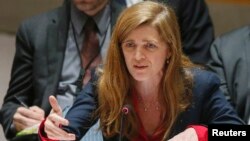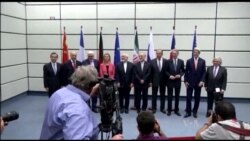The United States circulated a draft resolution in the United Nations Security Council on Wednesday that would lift all international sanctions related to the Islamic Republic’s nuclear program; but a U.N. arms embargo will remain in place for five years and one on ballistic missiles will continue for eight years.
No opposition is expected, as the five veto-holding council members – Britain, China, France, Russia and the United States – are all parties to the deal, so a vote could take place in the coming days.
U.S. Ambassador to the United Nations Samantha Power had said the United States would submit the draft resolution on behalf of the five powers, Germany and the European Union. She said it will endorse the deal and “take other important steps, including replacing the existing Security Council sanctions architecture with the new, binding restrictions agreed on in Vienna.”
Implementation Day
A U.S. official familiar with details of the draft resolution said once the measure is adopted, sanctions relief will not go into effect until what is known as “Implementation Day.” The official said that is when Iran completes key steps, including addressing outstanding questions about its nuclear program and converting its facility at Fordow into a center for studies on nuclear energy, physics and technology.
Watch related video by Carolyn Presutti:
The official said once these steps are completed the first stage of sanctions relief will begin and old sanctions resolutions will end. Some additional restrictions will also be kept in place, including the embargoes against conventional and ballistic weapons.
Praise from Russia
Speaking to reporters, Russia's U.N. ambassador, Vitaly Churkin, said, “This is one of the most complicated, imaginative and interesting draft resolutions the Security Council has ever considered." He said proper consideration should be given to the 10 elected council members who were not part of the nuclear negotiations to review and understand the text, adding, it is "a long resolution; it is a very detailed resolution."
Richard Gowan, a fellow at the New York University Center on International Cooperation, says sanctions relief was Iran’s “No. 1 goal” during the two years of nuclear negotiations.
The United States has made clear, however, that if Iran violates the deal, sanctions will “snap back” into place, but Gowan says that could be difficult at the United Nations, “because Moscow and Beijing are going to resist any effort to put sanctions back on Tehran.”
Randa Slim, a scholar at the Washington-based Middle East Institute, says Iran’s economy has suffered under international sanctions and most of the money it stands to receive now will be spent on reviving the economy, modernizing the oil sector and meeting the demands of the electorate which brought President Hassan Rouhani to power.
“At the same time,” she cautioned, “It does not mean that they are going to be stopping their support of Houthis in Yemen, or the Hashd [Shi'ite militias] in Iraq, or the support of [Bashar] Assad in Syria or the support of Hezbollah in Lebanon.”






